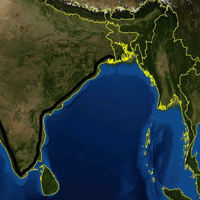After almost 40 years of intermittent and fruitless talks, Bangladesh and Myanmar appear close to a final settlement of their maritime boundary dispute in the Bay of Bengal. Frustrated with stalled negotiations, Bangladesh submitted the case to the International Tribunal for the Law of the Sea (ITLOS) in 2009. After a series of oral hearings in September, which included numerous technical arguments, the court recently adjourned and plans to deliver a ruling in March 2012.
The speed with which the case has progressed is in stark contrast to other maritime boundary disputes in Asia, but that is not surprising: There are no islands in the Bay of Bengal whose sovereignty is disputed, and both sides are anxious to develop the bay's oil and gas reserves. There remain some questions about what to expect from the pending ITLOS decision; as this is the tribunal's first boundary case, there is no direct precedent for its ruling. But while the outcome should provide the certainty both countries need to develop offshore energy resources, it could also create new sources of competition and complicate relations between South Asia's dominant power, India, and an increasingly Indian Ocean-oriented China.
For Bangladesh, a maritime boundary is almost a necessity -- it needs new sources of natural gas, and the undefined boundary is blocking offshore exploration for them. Growing domestic demand for natural gas has led to frequent blackouts and other disruptions, such as cuts in fertilizer production, to which natural gas is a key input. Declining output from a number of its more mature natural gas fields will only make shortages worse over time.

